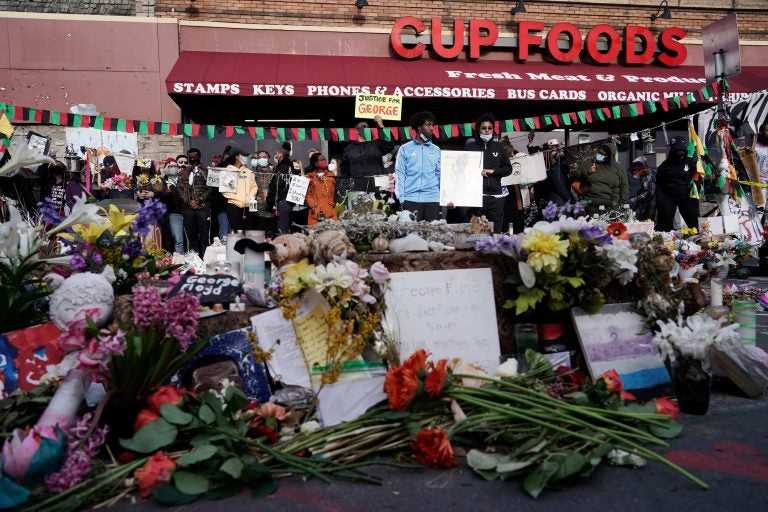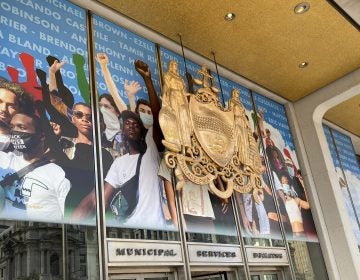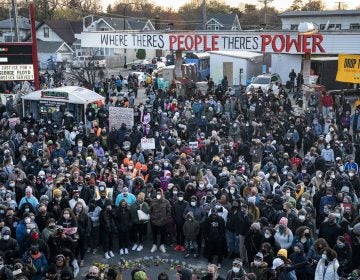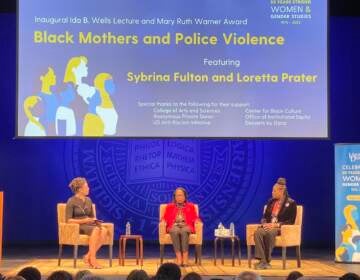Tears and relief sweep intersection where George Floyd was killed
In the place now known as George Floyd Square, a spot that millions around the world have seen in videos shot by bystanders during Floyd's arrest, there was relief.

People gather at Cup Foods after a guilty verdict was announced at the trial of former Minneapolis police Officer Derek Chauvin for the 2020 death of George Floyd, Tuesday, April 20, 2021, in Minneapolis, Minn. Former Minneapolis police Officer Derek Chauvin has been convicted of murder and manslaughter in the death of Floyd. (AP Photo/Morry Gash)
There was quiet, just for a moment, as hundreds of people standing in the intersection at 38th Street and Chicago Avenue crowded in to listen to the news.
“They’re announcing the verdict!” someone shouted, calling for silence.
Then thunderous cheering filled the place where George Floyd was pinned beneath a police officer’s knee nearly a year ago, begging for air and his mother. Many people wept. Some sobbed.
They were cheering the first guilty verdict for the fired officer, Derek Chauvin, who was charged with murder and manslaughter. Moments later, another wave of cheers swept the crowd as the other two verdicts — both guilty — were announced. Moments after that, Chauvin put his hands behind his back and was led out of the courtroom in handcuffs.
In the place now known as George Floyd Square, a spot that millions around the world have seen in videos shot by bystanders during Floyd’s arrest, there was relief.
Venisha Johnson jumped for joy when she heard the verdicts. Minutes later she could barely speak, she was weeping so hard.
“It means so much to me,” said Johnson, who was wearing a mask that memorialized some of Floyd’s final words: “I can’t breathe.”
“I’ve been praying for George every day, every morning at 6 a.m. I’m just so happy. The way he was murdered was terrible, but thank you, Jesus,” she said.
Some 300 people gathered in the intersection, home to Cup Foods, the corner convenience store where employees had called police on the evening of May 25, saying Floyd had paid for cigarettes with a counterfeit $20 bill. It was Memorial Day.
Since then, thousands have come to lay flowers at the site where Floyd had the air choked out of him. Or they came to stand beside the sculpture that now fills the middle of the street, a huge metal fist raised as a cry for justice. Or they look at the now-closed gas station, where the sign had been covered long ago with a demand: “Justice for George Floyd.”
On Tuesday, a protester climbed onto the sign to add two more words: “Justice Served?”
For those gathered on Tuesday, they had seen at least the beginning of justice.
“Let the healing work begin,” said Jennifer Starr Dodd, a Minneapolis woman, speaking through her tears. “Repentance, accountability, respect. You can’t have healing without repentance.”
By early evening, the square was a scene of celebration, prayer and community relief. More and more people streamed in. Someone played a tuba. There were occasional chants of “Say his name! George Floyd!” Parents brought children, showing them that, at least sometimes, a Black man could get justice.
Criminal convictions of police officers are exceedingly rare. There have been thousands of police shootings in the U.S. since 2005, but fewer than 140 officers have been charged with murder or manslaughter, according to criminologist Phil Stinson. Before Tuesday, only seven were convicted of murder.
Toni Hamilton, who brought her daughters to the intersection to hear the verdict, was deeply relieved at the news.
“I feel like for this whole time we’ve all been breathing with half of our breath,” she said. “Now there’s opportunity for the future. … There’s power when we all come together.”
It remains unclear what will happen to the square, which sprang up organically in the days after Floyd’s death, when community members put up homemade barricades to close it off. The city later replaced them with concrete barriers. It has been a place of pilgrimage and picnics, with people painting slogans and portraits on walls and the streets, leaving flowers and sometimes just hanging out and grilling hot dogs.
But neighborhood residents and entrepreneurs say the barricaded square led to a spike in crime and decimated businesses. City leaders have said they would reopen it after Chauvin’s trial, but the activists who serve as the square’s unofficial leaders say they will not step aside unless the city meets their long list of demands, including recalling the county prosecutor and firing the head of the state’s criminal investigative agency. Neither is likely to happen.
At one point on Tuesday, someone began throwing $1 bills in the air to symbolize the alleged counterfeit bill that led to Floyd’s death, and other people quickly followed. The money was soon collected in glass jars to become a donation — though it wasn’t really clear for what — and laid beside the flowers that now mark the spot where Floyd stopped breathing.
Eliza Wesley has been a near-constant presence at the square since Floyd’s death. She calls herself the Gatekeeper. Before the verdict was announced, she led the crowd in prayer.
“I don’t have any doubt in you, God,” she said. “We’ve been here for 11 months.”
“This is the day the Lord has made.”
Associated Press writer Kathleen Hennessey contributed to this report.

Get daily updates from WHYY News!
WHYY is your source for fact-based, in-depth journalism and information. As a nonprofit organization, we rely on financial support from readers like you. Please give today.






